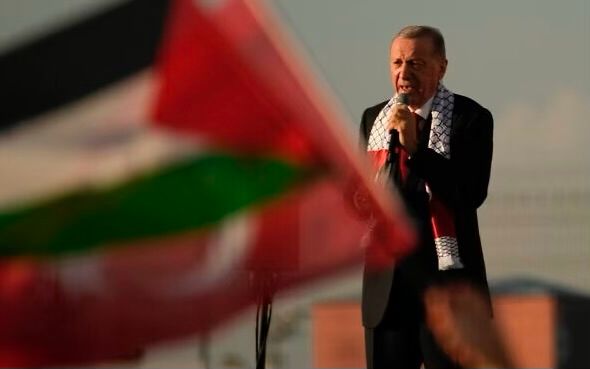Escalating Tensions: Israel Withdraws Diplomats as Erdogan Defends Hamas and Denounces Alleged War Crimes
In the face of escalating tensions and controversial rhetoric, Israel has taken the significant step of withdrawing its diplomats from Turkey, as President Recep Tayyip Erdogan continues to express strong support for Hamas and denounces Israel’s actions in Gaza as ‘war crimes’. This development marks a low point in

In the face of escalating tensions and controversial rhetoric, Israel has taken the significant step of withdrawing its diplomats from Turkey, as President Recep Tayyip Erdogan continues to express strong support for Hamas and denounces Israel’s actions in Gaza as ‘war crimes’. This development marks a low point in the Israel-Turkey relationship, with both nations grappling with the fallout from their leaders' harsh words and actions.
On Wednesday, Erdogan made a bold statement in the Turkish parliament, asserting that Hamas is not a terrorist organization, but rather a group of “mujahideen” fighting for their homeland. He made it clear that while Israel and the West may view Hamas as a terrorist group, Turkey does not share this view. This statement received a standing ovation from his party members and has since garnered significant international attention.
The Israeli Foreign Ministry was quick to respond, with spokesman Lior Haiat unequivocally rejecting Erdogan’s statements and labeling Hamas as a “despicable terrorist organization worse than ISIS”. Haiat’s statement highlighted the stark difference in perception between the two countries and underscored the complexity of the situation.
The tensions have been further exacerbated by the ongoing military actions in Gaza. Since October 7, when a large group of terrorists, allegedly from Hamas, launched a surprise attack across the Israeli border, resulting in significant loss of life and hostages taken, Israel has been engaged in a military campaign in Gaza. The Israeli government has justified these actions as necessary for counter-terrorism, stating that they are targeting terror infrastructure. However, Erdogan has condemned these actions, accusing Israel of bordering on genocide and urging for an immediate cessation of military operations.
Erdogan’s defense of Hamas is not a new stance; he has consistently supported the group over the years, even in the face of international criticism. He has also been critical of Israel’s actions in Gaza, further straining the relationship between the two countries. The current situation has placed additional pressure on diplomatic ties, which had shown signs of improvement over the past year and a half after a prolonged period of animosity.
Turkey has maintained deep ties with Hamas, allowing the group to operate an office in Istanbul, which Israel alleges is used for planning terror activities. Erdogan insists that this office only hosts the political wing of Hamas, but evidence provided by Israel suggests otherwise.
As the situation continues to unfold, the international community watches closely, hoping for a resolution that ensures stability and peace in the region. The escalating rhetoric and actions from both sides highlight the deep-seated tensions and differing perspectives, underscoring the need for diplomatic engagement and dialogue.




